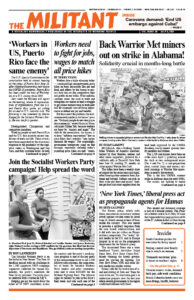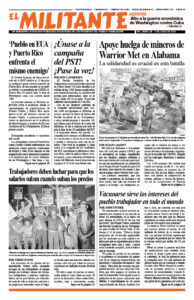The U.N. Special Committee on Decolonization held its annual hearing on the status of Puerto Rico June 18, after skipping the previous year due to the COVID-19 pandemic. Puerto Rico has been under the boot of Washington as a U.S. colony since 1898.
Next week the Militant will report on the hearing, where 18 representatives of organizations from the U.S. and Puerto Rico spoke, all calling for an end to U.S. colonial rule. The following is the statement by Martín Koppel for the Socialist Workers Party. He was the first speaker.
Distinguished Chairperson and committee members:
Working people in both Puerto Rico and the U.S. face assaults on our conditions of work and life. These attacks have been magnified by the disastrous response to the pandemic by the capitalist rulers in Washington and San Juan, and they continue today. In both countries, our class is seeking ways to fight back. And that is where the road forward lies.
In Puerto Rico, workers and farmers face unending attacks by the U.S.-imposed Financial Oversight and Management Board and the colonial government, whose priority is to pay the wealthy U.S. bondholders on the $74 billion debt at the expense of the vast majority. They have slashed jobs, pensions, and hard-won protections. But working people in Puerto Rico are not helpless victims — they are responding.
Protests are being held across the island against the privatization of the public electric company — a frontal attack on the electrical workers union UTIER that will also lead to higher electrical rates while enriching the owners of Luma Energy and the bondholders. Workers at the Swiss Dairy plant in Ponce won a strike for better wages and conditions. Independent truck drivers have taken to the streets for pay raises and against brutal job conditions. We urge working people in the U.S. and worldwide to support these struggles — they are an example to us all. We demand Washington cancel Puerto Rico’s debt. It’s not workers’ debt, it’s the bondholders’ debt!
A successful fight for Puerto Rico’s independence from Washington’s rule will also strengthen working people in the U.S. We face a common enemy: the U.S. ruling capitalist class, their government, and their parties, Democrats and Republicans alike.
Here too, the employers in the U.S. are attacking our jobs, wages, health care, pensions, and unions. Millions remain jobless even after the lifting of lockdowns. Many today face eviction from their homes. Rising prices for food, fuel, and other necessities are cutting into our living standards. The profit-driven medical system has wreaked havoc on the lives of millions.
In response to these conditions, 1,100 members of the United Mine Workers union in Alabama are on strike today for pay and benefit increases, and have won support from rail workers and others. Our party has backed strikes by Volvo workers, steelworkers, and hospital employees, as well as fights by ExxonMobil and Marathon refinery workers against company lockouts. We’ve joined protests against police brutality and the death penalty, to defend a woman’s right to choose abortion, and to demand the unconditional lifting of Washington’s criminal economic sanctions against Cuba.
All these are examples of dignity, solidarity, and fighting capacity. They shatter the bosses’ propaganda that dismisses workers and farmers in the U.S. as backward and helpless.
Through our own experiences, working people in the U.S. can identify with the resistance in Puerto Rico to the U.S. junta’s brutal cutbacks. More become convinced that workers in the U.S. cannot be free as long as Washington maintains its colonial bondage over Puerto Rico. Fighting together we can win.
There is a powerful living example for us today. In Cuba, working people in their millions carried out a socialist revolution and broke free from imperialist rule. They show that it’s possible to take state power from the capitalist class and begin to transform society in the interests of the vast majority. For six decades Cuba has shown us how a workers and farmers government can be used as a weapon to begin to uproot all forms of oppression — and to extend solidarity to others around the world fighting to be free from imperialist domination and capitalist exploitation.
Cuba’s revolutionary example shows the road to genuine freedom and independence for Puerto Rico, which we know will never be granted — it must be taken. Cuba’s example points the road forward for working people both in Puerto Rico and the U.S.
I thank the committee for the opportunity to speak here today, and I urge its continued condemnation of U.S. colonial rule over Puerto Rico.

